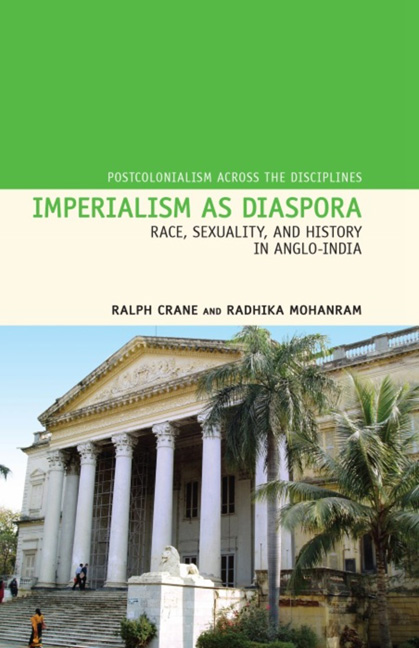Book contents
- Frontmatter
- Contents
- List of Illustrations
- Acknowledgements
- Introduction: Race, Gender, and Diaspora: Explorations of Anglo-India
- 1 Masculinity Forged Under Siege: The Indian Mutiny of 1857
- 2 The Terrains of Identity: Mimicry and the Great Game
- 3 The Missionary's Position: Love and Passion in Anglo-India
- 4 The Laws of Desire: Intimacy and Agency in Anglo-India
- Epilogue: Imperialism as Diaspora
- Bibliography
- Index
1 - Masculinity Forged Under Siege: The Indian Mutiny of 1857
- Frontmatter
- Contents
- List of Illustrations
- Acknowledgements
- Introduction: Race, Gender, and Diaspora: Explorations of Anglo-India
- 1 Masculinity Forged Under Siege: The Indian Mutiny of 1857
- 2 The Terrains of Identity: Mimicry and the Great Game
- 3 The Missionary's Position: Love and Passion in Anglo-India
- 4 The Laws of Desire: Intimacy and Agency in Anglo-India
- Epilogue: Imperialism as Diaspora
- Bibliography
- Index
Summary
For 150 years, the dreadful events which took place in parts of northern and central India during 1857 to 1858 have been referred to as the ‘Indian Mutiny’ within British imperial history and are now ensconced within Indian postcolonial history as the ‘First War of Independence’. In keeping with the militaristic nomenclature (‘mutiny’, ‘war’), Anglo-Indian literary representations of the events (which are also variously called the Great Revolt, the Sepoy Mutiny, the Sepoy Rebellion, the Sepoy Revolt, and the Freedom Struggle of 1857) are frequently articulated in terms of masculinity: as the need for British soldier heroes to protect British women from the savagery of Indian men. The politics of the private sphere are used in Mutiny fictions to mask the brutality of colonialism and to demonize the armed uprisings of a colonized people. In his annotated bibliography, India in English Fiction, 1800-1970, Brijen Gupta lists more than eighty Mutiny novels published in the ninety years between the uprising of 1857 and Indian Independence in 1947, the majority of which feature the soldier hero defending threatened white British womanhood as their central narrative trope, rather than the politics that instigated this particular historical event.
Mutiny novels were numerous enough and sufficiently popular in the late nineteenth and early twentieth centuries to form a discrete subgenre of the Anglo-Indian novel and imperial adventure story. Indeed, the Victorianist Christopher Herbert argues that ‘Mutiny fiction proliferated to the point of becoming a major subcategory of the British novel’ (273). As Hilda Gregg observes in ‘The Indian Mutiny in Fiction’, published in Blackwood's Edinburgh Magazine in 1897, ‘[o]f all the great events of this century, as they are reflected in fiction, the Indian Mutiny has taken the firmest hold on the popular imagination’ (218). Moreover, as Herbert notes, although few of these novels are ‘likely to strike readers as particularly distinguished, relative to the high artistic standard of Victorian popular fiction … they are particularly valuable as indices of popular consciousness of the time’ (273).
- Type
- Chapter
- Information
- Imperialism as DiasporaRace, Sexuality, and History in Anglo-India, pp. 22 - 54Publisher: Liverpool University PressPrint publication year: 2013



